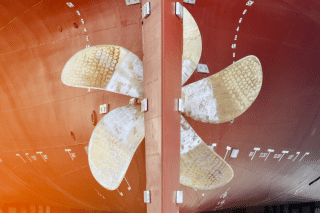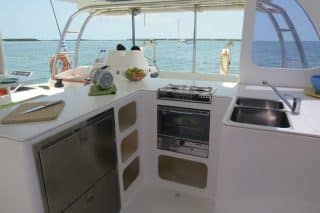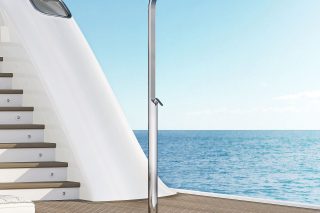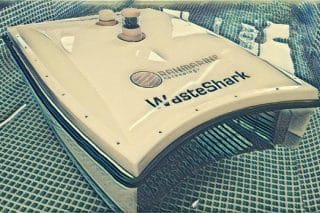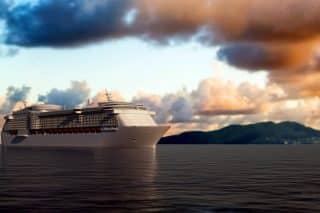Chinese ambitions in the autonomous ship market are moving into a new era. NauticExpo e-magazine talked to Ran Zhang, International Business General Manager at Oceanalpha, a Chinese company specializing in unmanned surface vessel (USV) manufacturing. According to him, the Middle Kingdom has an enormous advantage in the testing and regulation field compared to Norway, for example, who is currently the biggest player in the game.
Last February, a USV formation was staged on the sea in Zhuhai in southern China, not far from Hong Kong, one of the world’s busiest ports. Eighty autonomous vessels, 1.6 meters long each, gathered and formed an arrow for a special show through the Hong Kong-Zhuhai-Macao Bridge. In the same month, China began construction for a trial site for autonomous ships in the area. The Wanshan Marine Test Field will include 225 square nautical miles where technology such as obstacle avoidance and autonomous steering can be tested. The trial site project is the result of several partnerships including, among others, the Zhuhai government, Wuhan University of Technology and Oceanalpha who also collaborated on the multi-vessel show in Hong Kong.
NauticExpo e-magazine: Could you tell us more about your project of autonomous shipping? Will these ships be completely unmanned?
Ran Zhang: We’ve been working on this project since last year. It is still under development and we’ll try to launch it by the end of 2018 or the beginning of 2019. The project is a 50-m-long autonomous ship with no one onboard. But because of the current international maritime regulations we need at least 13 people onboard to make sure the boat will work properly and that it will have enough people to operate it.
In a first stage, we will be able to decrease this number to seven and eventually we can make the regulation to have no crew at all on board. We’re still negotiating with the law makers. We will only be able to run unmanned when the regulation will be ready for it. I think in 2025 it will.
Nonetheless, we are already allowed to test our vessel with no one aboard in the South China Sea. That’s a big advantage for us compared to our competitors to be allowed to test autonomous ships in real conditions.
NE e-mag: Why is this a big advantage compared to big players like Kongsberg?
Ran Zhang: Kongsberg is the biggest competitor right now. They even acquired Rolls Royce marine. They already launched the Yara Birkeland, which is completely unmanned. From a technology perspective, there is not a lot of difference between us and them. But in China, we have an enormous advantage on the testing field and on the regulation field.
In Europe, if you want to do something you cannot do it quickly, you always have to wait for the permission to do it. In China, we have a very good relationship with the government and the local government supports our project completely so I think we could do a lot better than other companies in launching a fully autonomous ship and starting commercial applications. Because to launch such a project you need to test it a lot to be sure that it will work properly. If you don’t have the opportunity to test it in real conditions or if it takes too long to have the permission to test it, then you’re going to be left behind.
NE e-mag: Is the goal of China to become THE big player in autonomous shipping?
Ran Zhang: Autonomous ships are part of the intelligent transportation of the future. The “Made in China 2025” government plan is clearly an opportunity for us. To us, autonomous ships will even arrive long before other autonomous vehicles like self-driving cars. The first commercial USVs will be on the water by 2025 when the regulation is ready. Autonomous ships will be used for various purposes ranging from maritime transportation and water environment monitoring to ocean engineering and surveys. It can also motivate a lot of young people to join this industry because they will not have to leave their home for a couple of months or years.
NE e-mag: Could you tell us more about the technology used by your company?
Ran Zhang: Oceanalpha’s autonomous system is a mix of artificial intelligence, supervision and dispatch system technology as well as a cloud server and data communication technology that allow for collision avoidance. Oceanalpha’s electric-propelled autonomous ship will be deployed in the Chinese area, to convey goods and food or even snakes from the mainland to islands located 50 km away. You can use battery for the power or a generator.
In the future, the company expects to use Quantum Communication Technology. This would make the vessel almost impossible to hack.
Regarding the auto-docking system, we already have four or five suppliers, most of them from Australia, who are working together to develop this technology. It can save a lot of time to dock in the harbor and cost less to do the extra construction for the cargos.
NE e-mag: What if this autonomous ship is hacked?
Ran Zhang: Even if the autonomous ship is hacked, it can’t affect the whole system because we have very high-protection mechanisms. The engine will automatically shut down and the vessel won’t be able to move. In the future, the company expects to use Quantum Communication Technology, a system similar to blockchain technology. It is characterized by high efficiency and absolute security. This would be a security solution for autonomous ship technology and would make the vessel almost impossible to hack.
NE e-mag: In the case of an accident with another boat, if the ship is unmanned who’s responsible?
Ran Zhang: Right now I have no answer because the regulation is still under process so I don’t know.



